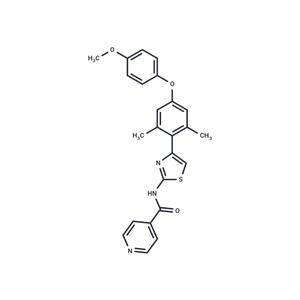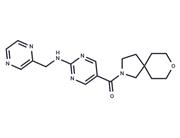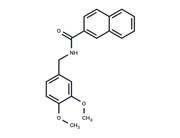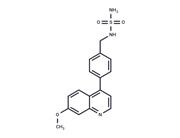| Name | TAI-1 |
| Description | TAI-1 is a potent and specific Hec1 inhibitor, which disrupts Hec1-Nek2 protein interaction. |
| Cell Research | Cells are seeded in 96 well plates, incubated for 24 hours, compounds added and incubated for 96 hours. All testing points are tested in triplicate wells. Cell viability is determined by MTS assay using CellTiter 96? Aqueous Non-radioactive Cell Proliferation Assay system according to manufacturer's instructions with MTS and PMS. Data retrieved from spectrophotometer are processed in Excel and GraphPad Prism 5 to calculate the concentration exhibiting 50% growth inhibition (GI50). All data represent the results of triplicate experiments.(Only for Reference) |
| In vitro | TAI-1 disrupts the binding of Nek2 to Hec1, which leads to degradation of Nek2 and chromosomal misalignment. TAI-1 shows strong growth inhibitory potency at nM levels across a broad spectrum of tumor cells, and produces synergistic activity with doxorubicin, topotecan and paclitaxel in leukemia, breast and liver cancer cells. [1] |
| In vivo | TAI-1 (20 mg/kg i.v. or 150 mg/kg p.o.) causes significant tumor growth delay in Huh-7 model and modest tumor inhibition in Colo205 and MDA-MB-231 models. [1] |
| Storage | Powder: -20°C for 3 years | In solvent: -80°C for 1 year | Shipping with blue ice. |
| Solubility Information | DMSO : 80 mg/mL (185.4 mM)
H2O : < 1 mg/mL (insoluble or slightly soluble)
Ethanol : < 1 mg/mL (insoluble or slightly soluble)
|
| Keywords | inhibit | Inhibitor | Apoptosis | TAI-1 | TAI 1 | TAI1 |
| Inhibitors Related | Stavudine | 5-Fluorouracil | Acetylcysteine | Kaempferol | Myricetin | Sodium 4-phenylbutyrate | L-Ascorbic acid | Dextran sulfate sodium salt (MW 4500-5500) | Metronidazole | Sorafenib | Tributyrin | Lidocaine hydrochloride |
| Related Compound Libraries | Bioactive Compound Library | Microtubule-Targeted Compound Library | Inhibitor Library | PPI Inhibitor Library | Bioactive Compounds Library Max | Cytoskeletal Signaling Pathway Compound Library | Anti-Cancer Compound Library | Anti-Cancer Active Compound Library |

 United States
United States



